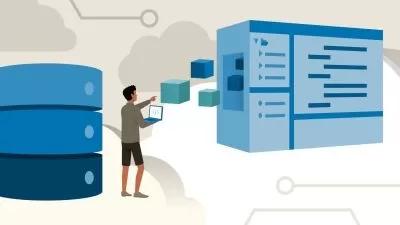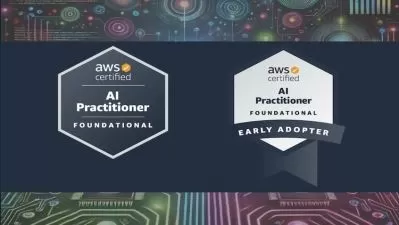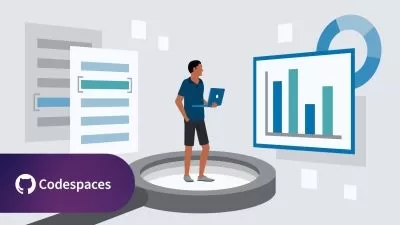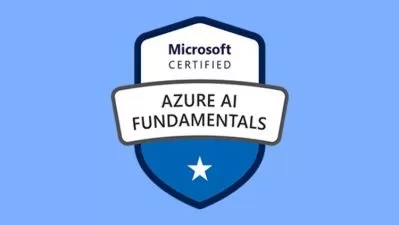About Microsoft AzureLearn More
Microsoft Azure is a public cloud computing platform with solutions that can be used for analytics, virtual computing, storage, networking, and more. To get an entry-level Azure certification, take the Microsoft AZ-900 Azure fundamentals exam – an excellent step for a career in cloud computing as a developer, architect, security professional or data scientist.
Sort by:
Sorting
The newest
Most visited
Course time
Subtitle
Frequently asked questions about Microsoft Azure
Microsoft Azure is Microsoft's cloud computing platform. Through Azure, organizations can acquire Infrastructure-as-a-Service (IaaS), Platform-as-a-Service (PaaS), and Software-as-a-Service solutions (SaaS). Azure administrators can build, test, deploy, and manage their applications and services through Microsoft Azure, and they can access resources such as virtual computing, analytics, storage, and networking. Microsoft Azure's largest competitor is Amazon Web Services, but Azure generally proves beneficial to those operating within a Microsoft ecosystem and using utilities such as Microsoft Office 365. As a cloud computing service, Microsoft Azure makes it easier for organizations to leverage and deploy large amounts of resources on-the-fly — paying only for the resources that are used and needed.
Those who are interested in Microsoft Azure jobs may want to consider getting Microsoft Azure certifications. There are a variety of certifications that can be acquired, including certifications directly from Microsoft. Microsoft provides "Microsoft Certified: Azure Fundamentals," "Microsoft Certified: Azure Developer Associate," and "Microsoft Certified: Azure for SAP Workloads Specialty" certifications for those on an Azure career track. There are additionally other certifications that you can acquire through organizations that provide boot camps and additional training for those interested in working with Azure. These certifications range from entry-level certifications, which can help a professional get their foot in the door, to advanced, expert-level certifications that you can use to progress along a career path in the tech industry.
Many popular companies use Azure: eBay, Boeing, Samsung, and BMW are a few. In terms of market share, Azure has been growing fast. While it doesn't have as much of the market as AWS, it does have much more of the market than Google Cloud. When it comes to Azure vs. AWS, many companies choose Azure because they are already on a Microsoft architecture and feel that it is both intuitive and reliable. Benefits of Azure over AWS include compatibility with .NET, robust security offerings, hybrid solutions for on-premise connectivity, and Microsoft's Enterprise Agreement (which provides superior support). However, there are benefits to AWS as well, and there are many professionals who can transition smoothly between both Azure and AWS environments.
Azure does not require coding skills. One of the major benefits to Microsoft Azure is that it has a fairly low barrier to entry. Knowing how to code does have its advantages though, especially for those who will be using Azure at a higher level. Configuration codes or deployment scripts may need to be programmed, which will require some knowledge of coding. Azure supports multiple programming languages, including C#, JavaScript, and F#, so programmers have options when programming in Azure. Most administrators will not need to code anything to configure or program Azure, but it may still be necessary when organizations use a custom infrastructure. Azure professionals should have at least a passing knowledge of SQL to interact with data.
Serverless architecture or serverless computing refers to a computing infrastructure through which the organization does not host applications on its own server but rather hosts and deploys them through a cloud solutions provider. Azure is one example of serverless architecture because its cloud servers host all applications and virtual machines rather than an on-premise host. With serverless architecture, organizations can leverage all the advantages of a powerful computing infrastructure without having to maintain physical infrastructure. The organization will not need to maintain, upgrade, or troubleshoot hardware, and it can deploy additional resources or reduce resources at will. Serverless architecture provides better flexibility for organizations, leaner budgets, and more streamlined operations.
Cloud computing is the delivery of on-demand computing resources over the Internet. These resources include data storage, processing power, applications, physical servers, virtual servers, development tools, networking capabilities, and more. Cloud computing platforms help businesses build their complete infrastructure in a distributed fashion on the Internet instead of in their in-house data center. This offloads the costs of maintaining a company's own infrastructure to a cloud provider who will bill for only what they use. Cloud platforms offer elasticity to a business so that they can scale services based on workload. Virtualization in a cloud environment enables cloud platforms to provide more value by dividing physical hardware into virtual devices. The distributed nature of the cloud gives every user a low-latency connection, whether at the office or on the road.
Microsoft Azure is an in-demand skill. Many companies use a Microsoft infrastructure — and it's a popular cloud computing service. Through a Microsoft Azure certification, individuals can improve their career opportunities. Microsoft Azure gets used throughout many fields, and industries and jobs related to Microsoft Azure are constantly growing. Those who have a background in network infrastructure, systems administration, or technical support can benefit from learning Microsoft Azure. Knowledge in Microsoft Azure can vary from typical maintenance (entry-level) to systems architecture (advanced). Consequently, someone knowledgeable about Microsoft Azure also has room to grow and develop their career.
Most people can begin learning about Microsoft Azure with little prior knowledge, though they may want to know the basics of systems administration, help desk services, and networking. Microsoft Azure has a tiered certification process. A Microsoft Azure Functional Consultant needs only to know the basics of Microsoft Azure's feature sets — to help customers plan their systems. A Microsoft Azure Administrator will need to learn about monitoring and maintaining the system. But to become an advanced Azure user (such as an Azure developer), you will need to understand the basics of cloud computing and programming. Other skills used with Microsoft Azure include data engineering, data science, artificial intelligence, and cyber security.




















